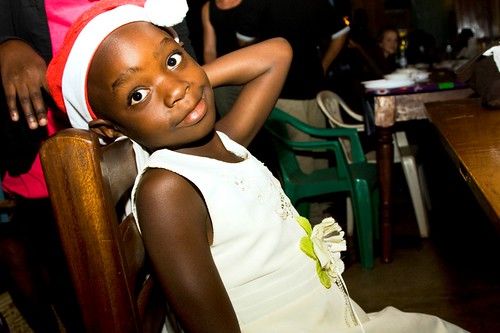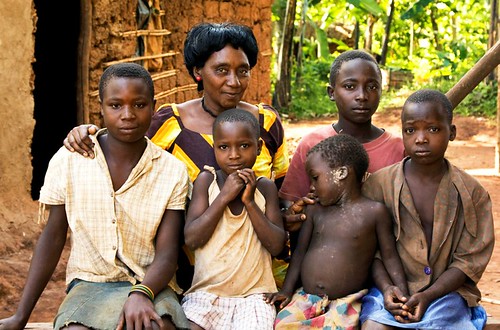My Christmases are usually spent at home nesting, my family and I lounging by the tree, unwrapping dozens of presents, cooking a massive meal, baking plates of cookies. My Christmas in Africa passed quite differently: I moved in taxis and bodas to visit family members, I didn’t open stockings and boxes, I fumbled making a meager dinner, I didn’t touch a single baking sheet.
On Christmas Eve Ester was at the hospital in Buikwe with Richard helping him recover from his surgery performed two days prior, and my girls were in the village with their father, extended family and tribal elders as customary during the holiday season. While visiting the hospital that day I asked Ester if it was alright for me to take her daughter Peanut, whom I was looking after while Ester was in the hospital, to Mukono to have dinner with some buzungus. Ester’s face lit up.
“Yeah, she will really like that,” she said laughing.
“That’s what I thought,” I said envisioning the girl enjoying eating foreign food and being surrounded by the strange, but enchanting buzungus.
As suspected, Peanut did have fun Christmas Eve dinning with the Europeans volunteers; she got a Santa hat from one of the women, practiced her photography skills with another woman’s camera and played soccer with some of the men; she did not like the holiday meal though.
“Peanut. Are you going to eat any of this?” I asked her after everyone else finished eating, eyeing the girl’s plate still piled with lasagna, quiche and pasta. She shook her head. I took the leftovers unable, especially after living in Africa, to let anything go to waste; it was also a welcomed and rare opportunity to taste Western food. “Let me get you more chapatti and kebobs,” I said fetching for her the only two African dishes on the spread.
My namesake and I ate our meal then spent the night at the well maintained property filled with wide bandas and tall trees and floating birds and cackling monkeys resting on a hill overlooking Lake Vic and Kampala – a former children’s home that now serves as housing center for a European charity. We awoke the next drizzling morning and walked through the fog along the hillside toward town; the roads were quieter, the taxi conductors a bit friendlier, but it was generally an ordinary morning; it certainly didn’t feel like Christmas.
At home we found some of my little friends: a group of young girls who visit on occasion, sitting on the floor of our main room quietly watching me amused and intrigued, sometimes I have them do my wash or help me clean the house; they are good friends to have indeed.
“Hi ladies! How are you?” I asked the foursome.
“We are fine.”
“Merry Christmas!” I said entering my bedroom. “I am sorry, but I have to leave now for the hospital. I just came to drop off my things and change.”
Peanut and I then went for town to purchase some gifts and supplies and boarded a taxi for the Buikwe. After jumping along the dirt road for twenty minutes we arrived at the hospital to find Richard drugged up; eyes swimming; face placid. I tried to greet him but he stared at me blankly. I smiled at his confusion, stroking his head.
Soon thereafter the nurse administered more medication through his IV. The boy had to be sedated during his daily dressing since the surgical wound was so deep, penetrating well into the bone, he could not to be conscious while it was flushed and repacked with iodine-soaked gauze.
I accompanied the boy to the dressing room as he fell under, head and eyes rolling back, fear and pain vanishing from his face. I then watched the doctors pour hydrogen peroxide into the large, unsutured hole pink fuzz bubbling and pouring out of his leg like a child’s science experiment; the doctors informed me they had removed a six by two inch section of dead bone during the operation. We had to go very deep.
When Richard was again coherent, gazing at me in recognition, I pulled his gift from my bag.
“Look Richard, I got a car for you,” I said handing him a yellow toy car. He smiled and played with it dully, still weighted by narcotics.
“Mommy! I want a gift!” Peanut exclaimed to me looking at Richard’s present and the remaining gifts in my bag.
“No Peanut. Those dolls are for Rachel and Sylvia. Your Christmas present was going to Mukono and staying the night in a nice place and eating good food and taking pictures with buzungus.” Apparently that wasn’t enough: Peanut started crying. Ester laughed at her daughter’s stubbornness, and eventually another doll was bought.
Peanut crying on Mama Ester because she didn't have a doll
After spending a couple of hours with the Richard and Ester, Peanut and I had to make our way to the village to check on the girls. We boarded a boda and traversed the back roads of Buikwe to the children’s ancestral home. The ride took nearly 30 minutes, but was peaceful and beautiful; we floated over the red mud under the grey, but lightening skies, villagers waiving at us while they prepared their Christmas dinners on charcoal stoves outside, village children frolicking barefoot in their tattered soiled clothes, goats and dogs running through the thick green vegetation blanketing the rolling hillsides. We finally arrived at the children’s plot. The girls ran to me screaming, “Mommy! Mommy!”
I handed them their $0.25 plastic dolls. They threw their hands in the air with elation. Then I noticed Taka was hobbling on one leg.
“What happened here?” I asked grabbing her foot.
Apparently she had caught her foot in a bicycle. The open wound covered nearly half her foot, was partially scabbed over, oozing and Christmas green.
This father is a total and complete idiot. He can’t even look after the children for a couple of days.
We stayed a short time then I told the father I was taking Rachel back because she needed to go to the hospital.
“You take B2 to help you with Rachel,” he suggested. I wasn’t sure why I needed Beatrice to help me look after Rachel, but I wasn’t thrilled about the girls staying with their irresponsible and addicted father, so I didn’t protest. As the four of us climbed on the boda back to town, Sylvia’s face fell, she cried wanting to come with us.
“No, Nabu. You stay here a couple of more days with your family and Agnes,” I reassured her. “Here play with your dolly. Mommy will see you soon.”
The three girls and I returned to Lugazi as dusk fell and the town’s few lights blinked on. I made a face disembarking from the motorbike: I now had two more mouths to feed and the Balazas were in Kampala visiting other family members and I didn’t really know how to cook in an African kitchen; I would just have to give preparing an African Christmas dinner my best shot.
I bought some meat, rice and vegetables and began chopping in my hands with a broken knife, fetching water from the bathroom faucets, picking stones from the low-quality rice, pulling bananas from cupboards for boiling. After a few hours we sat down to eat and I pleasantly surprised the girls and myself with an unburned meal.
B2 eating Christmas dinner
“It is good?” I asked them as they shoved food in their mouths at our undecorated table.
“Yes!” The answered merrily, Rachel sticking her thumb in the air.
“So did you have a good Christmas?”
“Yes!” They exclaimed again. I looked at my children’s happy faces; it was wonderful having them back after their being gone just a couple of days.
“Good. I had a good Christmas too.”
Peanut and Rachel playing with their dolls













Merry Christmas and great job on cooking!
ReplyDelete-h